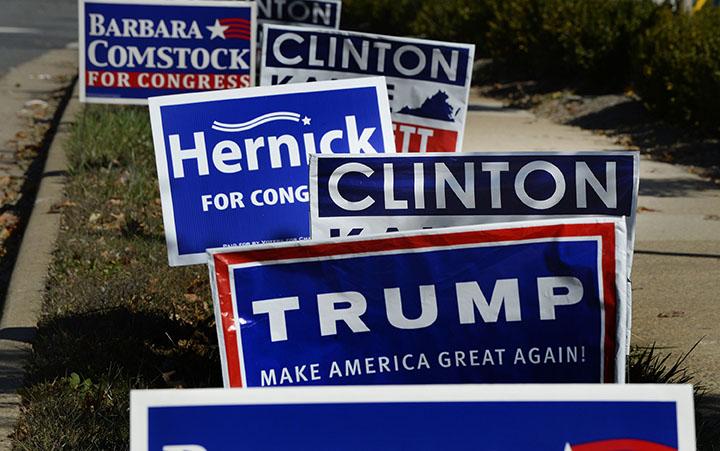Election Update and Campaign Rhetoric
A Republican Presidential candidate Donald Trump campaign sign and a Democartic Presidential candidate Hillary Clinton sign are posted on a road 10 days away from the 2016 presidential election, on Oct. 28, 2016 in Mclean, Va. (Olivier Douliery/Abaca Press/TNS)
As the election season comes to a close, Americans must decide who they see fit to be the next president of the United States. The third presidential debate, on October 19th, left Americans with vastly different opinions.
There have been arguments about who really “won” the debate, with Donald Trump himself tweeting that he won the debate. Let’s take a look at the facts.
According to one of Mr. Trump’s most recent tweets, national polling predicts a Trump victory by a 3% margin. The RealClearPolitics polling average, however, shows the two candidates battling for the slimmest of margins.
Public opinion polls suggest that the final presidential debate was highly influential for many voters. They believe that this debate focused on relevant issues, a stark contrast from the rhetoric of the prior two debates.
That being said, during the debate there was name-calling and other underhanded comments. Unlike the prior debates, Mr. Trump and Mrs. Clinton did not pretend to be on good terms, neglecting to shake hands, a symbol of respect and pre-debate tradition. The debate started off strongly – both candidates made persuasive points (according to live polling).
This changed dramatically when Mr. Trump argued that the election is rigged and could not confirm he would concede the election if Mrs. Clinton were to win.
The debate then transitioned into personal accusations. Mrs. Clinton called Mr. Trump out for always blaming the system for his failures and accusing everything of being “rigged.” Mr. Trump responded in kind, with bold accusations about the Mrs. Clinton e-mail controversy.
Much of the debate content addressed controversial and very partisan issues, such as abortion. Mr. Trump vowed to appoint Supreme Court justices who would overturn Roe v. Wade, the landmark decision that legalizes abortion.
He argued that abortion is the process in which you “take the baby and rip the baby out of the womb of the mother just prior to the birth of the baby.” This comment, especially, angered many pro-choice Americans.
On the other hand, many viewers, especially conservatives, did agree with Mr. Trump’s views in lieu of those of Mrs. Clinton, who is a strong pro-choice advocate.
While polling predicts this election will be decided by narrow margins, up to ten-percent likely voters has not decided for whom they will vote. In the eyes of most Americans, this election will inform society for years to come.



